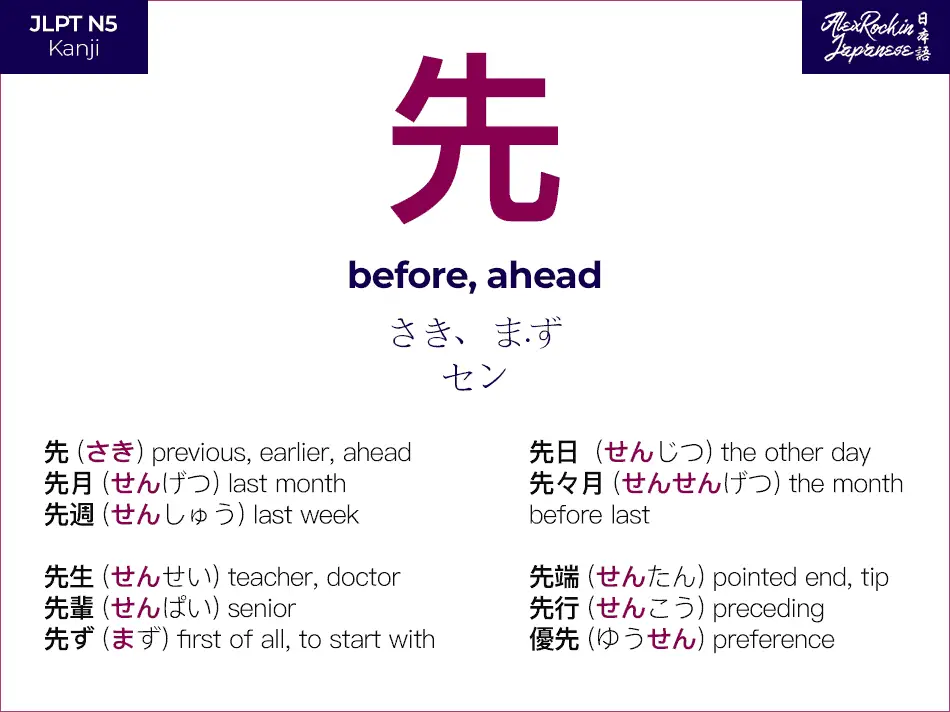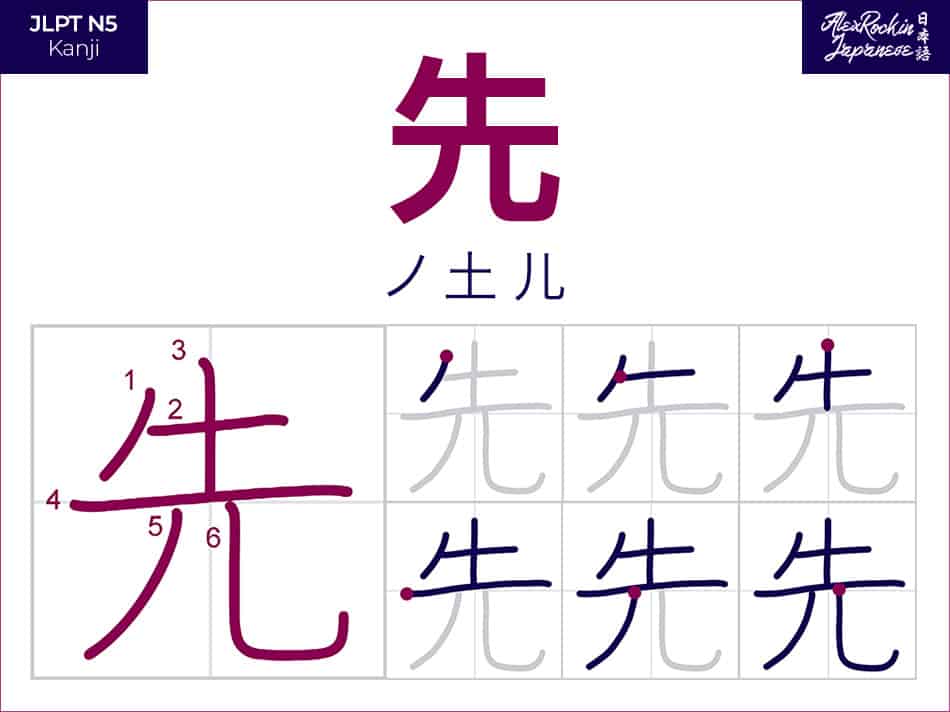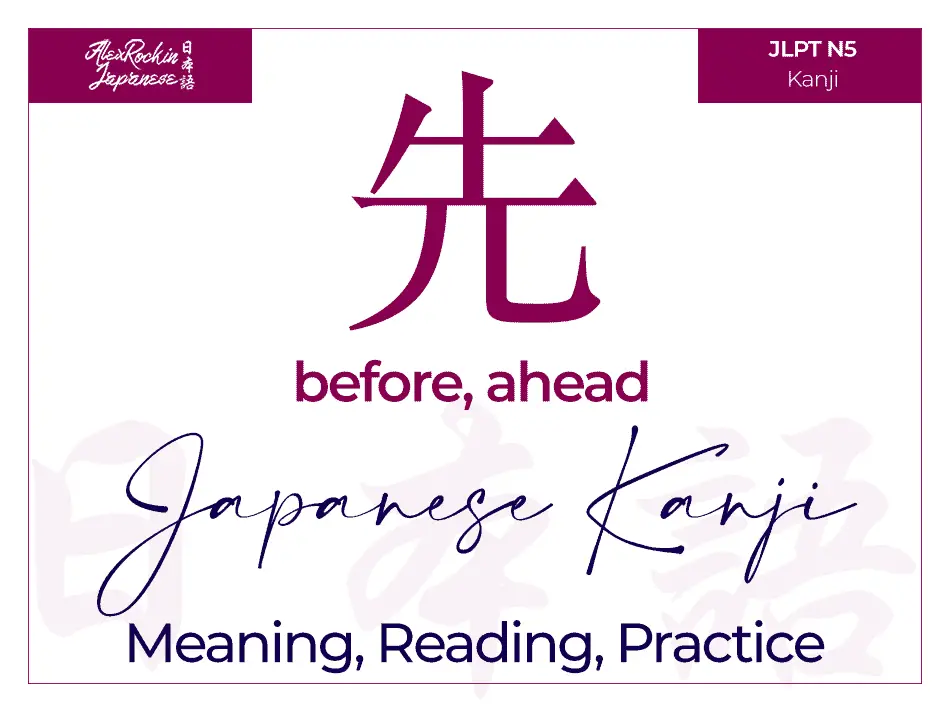The Japanese Kanji 先 is part of the JLPT N5 Kanji list and pretty easy to write and to remember. In contrast to its stroke order and readings, though, the seemingly contradictory meanings of 先 can be a little bit confusing.
先 is a Japanese Kanji meaning “before” or “ahead”, both in time and space. As a single kanji, it is usually read as “saki” and in kanji compound words it is most often “sen” but sometimes it can also be “saki”. 先ず is an important exception. It is pronounced “mazu”. The kanji’s stroke count is 6.
In Kanji dictionaries, you will often see that another meaning of 先 is “future”, which is quite confusing since it means “before”, right? But just think of it as “ahead (in time)” in this situation. Below you will find all the vocabularies with 先 you need to know for the JLPT tests and the readings of other common words. You can also test your kanji knowledge in the little practice section at the end.
Kanji Overview & Meaning

Meaning: before, ahead, previous, future, precedence
訓読み: さき、 ま.ず
音読み: セン
Kunyomi: saki, ma.zu
Onyomi: sen
Strokes: 6
JLPT Level: N5
Jōyō Kanji: Grade 1
Heisig Kanji Index: 263
Frequency in Newspapers: 173 of 2500
How to Write

Strokes: 6
Radical: 儿 legs (no. 10)
Kanji Parts: ノ (1 stroke), 土 (3 strokes), 儿 (2 strokes)
Similar Looking Kanji: 洗, 充, 尢, 売, 充, 光, 赤, 芫, 完, 究, 去
JLPT Vocabulary List
JLPT N5
先 (さき, saki) previous, earlier, prior, former
先月 (せんげつ, sengetsu) last month
先週 (せんしゅう, senshuu) last week
先生 (せんせい, sensei) teacher, doctor
JLPT N4
先輩 (せんぱい) senior
JLPT N3
先ず (まず) first (of all), to start with, hardly (with neg. verb)
先日 (せんじつ) the other day, a few days ago
JLPT N2
先々月 (せんせんげつ) the month before last
先々週 (せんせんしゅう) the week before last
先程 (さきほど) some time ago
先端 (せんたん) pointed end, tip, fine point
先頭 (せんとう) head, lead, vanguard, first
真っ先 (まっさき) first, first and foremost, first thing
先祖 (せんぞ) ancestor
祖先 (そせん) ancestor
JLPT N1
お先に (おさきに) before, ahead, previously
先に (さきに) before, earlier than, ahead, beyond, away, previously
先先月 (せんせんげつ) the month before last
先先週 (せんせんしゅう) the week before last
先だって (せんだって) recently, the other day
優先 (ゆうせん) preference, priority
先行 (せんこう) preceding, going first
先着 (せんちゃく) first arrival
先代 (せんだい) family predecessor, previous age, the previous generation
先天的 (せんてんてき) a priori, inborn, innate, inherent, congenital, hereditary
勤め先 (つとめさき) place of work
Readings
Kunyomi
さき
先 (さき) previous, prior, former
お先に (おさきに) before, ahead, previously
先に (さきに) before, earlier than, ahead, beyond, away, previously
先程 (さきほど) some time ago
先頃 (さきごろ) recently, the other day
先々 (さきざき) distant future, inevitable future
先行き (さきゆき) the future, future prospects
目先 (めさき) before one’s eyes, immediate, near future
行き先 (ゆきさき) destination, whereabouts, future
宛先 (あてさき) address
指先 (ゆびさき) fingertip
手先 (てさき) fingers, underling
つま先 (つまさき) tiptoe, tips of the toes
先送り (さきおくり) postpone
先手 (さきて) front lines, vanguard
真っ先 (まっさき) the head, foremost, beginning
先駆け (さきがけ) charging ahead of others, leading an attack, taking the initiative, pioneer
勤め先 (つとめさき) place of work
小手先 (こてさき) cleverness, the tip of one’s hand, perfunctory, dexterity
矛先 (ほこさき) spearhead, point of a spear, the aim of attack, the force of an argument
先安 (さきやす) lower future quotations
ま.ず
先ず (まず) first (of all), to start with, hardly (with neg. verb)
先ず無い (まずない) seldom, rarely, scarcely
Onyomi
セン
先月 (せんげつ) last month
先々月 (せんせんげつ) the month before last
先先月 (せんせんげつ) the month before last
先週 (せんしゅう) last week
先々週 (せんせんしゅう) the week before last
先先週 (せんせんしゅう) the week before last
先日 (せんじつ) the other day, a few days ago
先だって (せんだって) recently, the other day
先制 (せんせい) head start, preempt, initiative
先生 (せんせい) teacher, doctor
先輩 (せんぱい) senior
先駆 (せんく) forerunner, pioneer
先祖 (せんぞ) ancestor
祖先 (そせん) ancestor
先人 (せんじん) predecessor, pioneer, ancestor
先代 (せんだい) family predecessor, previous age, the previous generation
先天的 (せんてんてき) a priori, inborn, innate, inherent, congenital, hereditary
先決 (せんけつ) deciding first, deciding in advance
優先 (ゆうせん) preference, priority
先頭 (せんとう) head, lead, vanguard, first
先行 (せんこう) preceding, going first
先例 (せんれい) precedent
先着 (せんちゃく) first arrival
機先 (きせん) forestall
先端 (せんたん) pointed end, tip, fine point
互先 (たがいせん) even game (esp. in go)
先方 (せんぽう) the other party, the other side, ahead, destination
先導 (せんどう) guidance, leadership, leading the way
先進 (せんしん) advance, seniority, leadership
先進国 (せんしんこく) advanced (developed) country
先入観 (せんにゅうかん) preconception, prejudice
先見 (せんけん) foresight, anticipation
Practice & Review
Easy
1. 中山さんは先生ですか。
a) せんせえ
b) せんぱい
c) ぜんぜい
d) せんせい
2. 先週スリッパを買いました。
a) last month
b) last week
c) next month
d) the week after
3. _____ に行ってください。
a) 先ず
b) 後で
c) 先
d) 先週
4. 彼は先月アメリカへ旅行しました。
a) せんげつ
b) せんしゅう
c) らいげつ
d) らいしゅう
5. 中山センパイはあのビルの中に居ます。
a) 先輩
b) 先生
c) 後輩
d) 先任
6. 先に寝てていいよ。
a) in front of me
b) before me
c) after me
d) in the future
7. センセイはどこですか。
a) 先輩
b) 後輩
c) 先性
d) 先生
8. _____ めちゃくちゃ忙しかったから休みがなかった。
a) 明日
b) 来月
c) 来週
d) 先月
9. 先週外国から帰ってきたばかりです。
a) らいしゅう
b) せんしょう
c) せんしゅう
d) さきしゅう
10. 先週、先輩に会って、一緒に買い物をしたり、喫茶店に行ったりしました。
Translations
- なかやま さん は 先生 です か。
Is Mr. Nakayama a _____?
Are you (Mr. Nakayama) a _____? - 先週 スリッパ を かいました。
I bought slipper _____. - さきに いって ください。
Please go _____ . - かれ は 先月 アメリカ へ りょこう しました。
_____ he made a trip to America. - なかやま せんぱい は あの ビル の なか に います。
Nakayama-senpai is in that building over there.
(Our ______) Nakayama is in that building over there. - 先 に ねてて いい よ。
You can go to bed _____. - センセイはどこですか。
Where is our _____? - せんげつ めちゃくちゃ いそしかった から やすみ が なかった。
I was extremely busy _____ so I didn’t have any vacation. - 先週 がいこく から かえってきた ばかり です。
I just came back from my trip abroad _____. - せんしゅう、 先輩 に あって、 いっしょに かいもの を したり、きっさてん に いったり しました。
Last week I met my _____ and we went shopping and to a cafe together.
Answer Key
- d) 先生, せんせい, teacher (or doctor)
- b) 先週, せんしゅう, last week
- c) 先, さき, “ahead” or “ahead of me”
- a) 先月, せんげつ, last month
- a) 先輩, せんぱい, senior
- b) 先, さき, before me
- d) 先生, せんせい, teacher (or doctor)
- d) 先月, せんげつ, last month
- c) 先週, せんしゅう, last week
- 先輩, せんぱい, senior
Intermediate
1. 先々月の電気料金を払うのを忘れてしまった。
a) さきさきげつ
b) せんせんげつ
c) せんせんがつ
d) さきさきつき
2. 私の先祖はドイツからアメリカにやってきた。
a) せんぞ
b) せんそ
c) せんぞう
d) そせん
3. _____ 何をすべきか分からなかった。
a) 優先
b) 先す
c) 先端
d) 先ず
4. 先程お客様にメールを送りました。
a) せんほど
b) さっきほど
c) さきほど
d) さきほうど
5. 地震が来たら、_____ に何をしますか。
a) 真っ先
b) 真つ先
c) 先っ真
d) 頁っ先
6. これが先日あなたが話していた本じゃん?
a) the day before yesterday
b) yesterday
c) the next day
d) the other day
7. 天皇の祖先はアマテラスという女神をご存じですか。
a) そぜん
b) ぞせん
c) そせん
d) せんぞ
8. 先々週の月曜日に地下鉄が30分停電した。
a) the week after next
b) the week before last
c) the month before last
d) last week
9. 市長は行列の先頭に立って歩いています。
10. ペンの先端内部にはタッチセンサーが付いていますので、先端が押されると電池を消耗します。
Translations
- 先々月 の 電気りょうきん を 払う のを 忘れてしまった。
I forgot to pay my electricity bill for _____. - 私の先祖 は ドイツ から アメリカ に やってきた。
My _____ came to America from Germany. - まず 何を すべき か 分からなかった。
I didn’t know what to do _____. - 先程 お客さま に メール を 送りました。
I sent the client an email _____. - 地震 が 来たら、_____ に 何 を します か。
When an earthquake occurs, what will you do _____? - これ が 先日 あなた が 話していた 本 じゃん?
Isn’t that the book you spoke about _____? - てんのう の 祖先 は アマテラス という めがみ を ご存じ です か。
Do you know that the emperor’s _____ is a goddess called Amaterasu? - 先々週 の 月曜日 に 地下鉄 が 30分 ていでん した。
On Monday _____ the subway had a power outage for 30 minutes. - しちょう は ぎょうれつ の 先頭 に 立って歩いています。
The mayor is walking at the _____ of the procession. - ペンの先端内部にはタッチセンサーが付いていますので、先端が押されると電池を消耗します。
Since the _____ of the pen is equipped with a touch sensor, the battery will be drained when the _____ is pressed.
Answer Key
- b) 先々月, せんせんげつ, the month before last
- a) 先祖, せんぞ, ancestors
- d) 先ず, まず, first
- c) 先程, さきほど, some time ago (or a while ago)
- a) 真っ先, まっさき, first and foremost
- d) 先日, せんじつ, the other day (or a few days ago)
- c) 祖先, そせん, ancestor
- b) 先々週, せんせんしゅう, two weeks ago (or: the week before last)
- 先頭, せんとう, head
- 先端, せんたん, tip
Related
後で
前に


